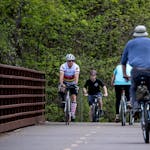 See
more of the story
See
more of the story
Late Tuesday morning when heavy snow started falling, I was in southern Minnesota headed north among wet flakes that slanted across four-lane blacktop. The weather change had been forecast by professional worrywarts from Worthington to Winona, who summoned deep timbres to urgently broadcast their two-bit alerts. February in Minnesota and snow billowed from a swirling sky. This was the news. The public was anxious.
As an aside, years ago when I was in college looking for an easy three credits, I threw a dart and ended up in a sociology class. Whatever I learned I've since forgotten. But in the years that followed, the observation, if not study, of human society has for me moved to the front burner, not least because nothing stays the same, year to year, even day to day — the beauty and appreciation of weather vagaries being one example.
Rewind also to a time after college, when for a few years I drove a truck coast to coast. Then I moved to Ely and for a time lived in an insulated garage with a barrel stove for heat. This was on Garden Lake, lying partly inside and partly outside the wilderness. The snow was deep that winter and occasionally at night wolves howled on the lake. The pine-lined road leading to the garage was banked high with snow and when I heard the wolves I pulled on boots, wool pants and a heavy coat and climbed over the snow to reach the lake and howl back. As I did, either better or worse weather was coming or going. Happily, I had no clue.
Times were different then. My older brother, Dick, and a friend, Bob Whitten, had spent the previous years stockpiling drawers full of heavy-duty clothes in advance of a planned homesteading trip to the Yukon. Dick owned a cool precursor to the modern-day Suburban manufactured in 1966 and commonly referred to as a Chevy Carryall. An engineer, Dick is good with a wrench and regularly he sprawled beneath the four-wheel-drive rig fine-tuning it for the pilgrimage north.
I owned a '56 Willys pickup powered by a blown V6 Buick that squatted on four oversized Desert Dogs I bought from Dick Cepek while laid over in my truck in L.A. This was in the early to mid-1970s and no one I knew aspired to the split-levels that willy-nilly were eating up otherwise good country surrounding the Twin Cities. You couldn't count on much, the government least of all, and heading north seemed a good option.
By then for many years Sigurd Olson and others had written vividly about canoe travel and about the seduction of the boundary waters and other points north. Olson in particular suggested in his books that the mystique of wilderness extends beyond its trees, land and water to include its interaction with human visitors. Ultimately, he believed, immersion in noncivilized surroundings, including the wildest weather, prompted over time a reconnection of people to their evolutionary heritage, leading in the best of circumstances to a theology that revered not just "nature" but all creation and, necessarily, the need to conserve it.
All well and good. But like most of my Ely friends, I was more interested in paddling, camping and fishing in the boundary waters than philosophizing about it. It wasn't that Olson's writings fell on deaf ears. Rather, rain or shine, mosquitoes or not, spring, summer, fall or winter, we grabbed all of it we could, our destination the horizon beyond, Duluth packs on our backs or between thwarts.
Included in the allure of this travel was the ever-changing weather — not only its effect on us, but on the black ducks that arrowed over our campsites, the moose on the shoreline and the walleyes beneath our canoes. Faith in oneself is the rain that cultivates the hero to endure the storm, said Mike Norton, the writer, and somewhere in that, over many paddling trips, is what we found. And kept.
On Tuesday evening after I returned home from southern Minnesota, I loosed the dogs to romp in the deeply piled fresh snow. The pastures by then were covered by 8 inches of it, as was the footpath we followed in the woods.
Time passed. The walk became a hike, the hike a celebration. Had a bird been flying high overhead, lost in the maelstrom, it would have seen not only the dogs and me but, in houses near and far, the flickering lights of TVs broadcasting the two-bit weather alerts of professional worrywarts.
Still the dogs romped, chasing their tails and each other. And me.
Dennis Anderson • danderson@startribune.com




